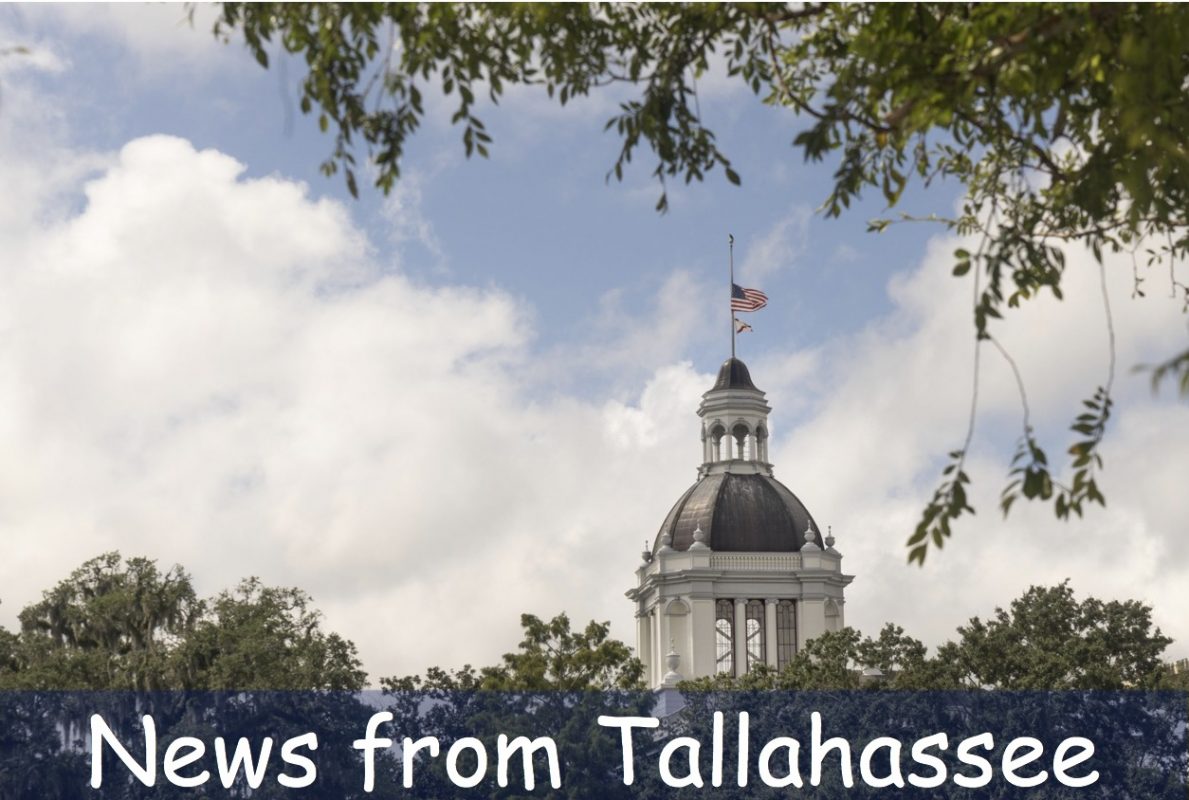This month in Florida Government news: 2020 legislative session begins; Governor DeSantis remains focused on water quality and Everglades restoration; parental-consent abortion bill likely among the first bills to pass. For these stories and more Florida government news, read on …

January 14 was the start of Florida’s 60-day annual legislative session, and as I write this update, the first three weeks of session are behind us.
I will begin this post with Governor Ron DeSantis’s State of the State address and opening remarks by House Speaker José Oliva and Senate President Bill Galvano. Then I will highlight some of the significant issues that have traction and some important developments in other areas of state government, and close with news about our two U.S. senators.
The 2020 Legislative Session
The Legislature’s only constitutional responsibility is to pass a balanced budget. As Week Three ended, the House and Senate released their budget proposals. The House calls for $91.4 billion in spending (similar to Gov. DeSantis’s proposal); the Senate calls for $92.8 billion. All three plans exceed the current year’s $90.8 billion budget, which would make FY 2020-21 the eighth consecutive year of budget increases (more here). Less than six weeks of the regular session remain to work out the differences.
- Florida Senate, House $1.4 billion apart on budget proposals. APNews, 1/31/20
But of course, they’ll do much more than pass a budget. Over 3,400 bills have been filed to date, and several hot-topic issues are already making their way through the legislative process.
Opening Remarks
Gov. DeSantis spoke of seven priorities in his State of the State address:
- Taxes: Maintain Florida’s fiscal health: tax lightly, spend wisely and regulate reasonably.
- Environment: Fund water resource projects at $625 million a year for the next three years; implement initial recommendations of the Blue-Green Algae Task Force; adopt regulations that penalize municipalities that fail to upgrade their water infrastructure; fortify the state’s infrastructure in areas most vulnerable to increased flood risks.
- Immigration: Pass E-Verify.
- Education: Pass $47,500 minimum salary for public school teachers; replace Best and Brightest bonus program with a “more equitable” one; replace Common Core with new approach that focuses on strong standards, high-quality curriculum, streamlined testing and renewed emphasis on American civics.
- Adoption: Modify the state’s adoption process to make it as transparent and user-friendly as possible.
- Abortion: Pass parental consent bill.
- Recovery: Renew $25 million Hurricane Michael grant program to assist with recovery in northwest Florida.
Shortly after DeSantis delivered his address, Florida Democrats and their allies delivered their response:
- Dems respond to Gov. DeSantis: What about Medicaid expansion, affordable housing, higher wages for workers? Florida Phoenix, 1/14/20
Also following the governor’s address, the leaders of the Senate and House gave their own opening remarks.
President Galvano’s were a reflection of his leadership style as well as a comment on our times:
“As we go into this session let us continue to show our constituents that we can exchange and debate ideas while maintaining civility and decorum. That we can problem solve together. That we can put aside personalities and politics for good policy. And, that we are not a microcosm of Washington, D.C., but instead will continue to be an example for Washington, D.C.” – Sen. Bill Galvano, Press Release
- Senate president doesn’t set his agenda to start session but does quote Mother Teresa. Miami Herald, 1/14/20
Speaker Oliva’s remarks were more specific, continuing his focus of last year on reducing the cost of healthcare delivery:
“The Healthcare Industrial Complex made up of hospitals, medical device manufacturers and pharmaceutical companies are the Great Robber-Barons of our time…. The drumbeats of socialized medicine grow louder each day but so attached are they to their gravy train that they fall deaf to its warning…. Florida’s archaic and backwards approach to scope of practice has contributed the problem…. It is high-time we allow healthcare professionals to practice to the extent of their training!” – Rep. José Oliva
- Florida House Speaker José Oliva goes after healthcare costs. Tampa Bay Times, 1/14/20
The Budget
- DeSantis may want to keep a teacher bonus plan, but Legislature doesn’t. Miami Herald, 1/29/20
- House and Senate disagree on Visit Florida, Florida Forever funding. News Service of Florida via Tampa Bay Business Journal, 1/30/20
Abortion: Parental Consent
Florida could become the 18th state to enact an abortion restriction in the past year as it considers a measure requiring parental consent – not merely notification – before a minor can legally obtain an abortion. The long game in several states is to get abortion back before the U.S. Supreme Court, with the hope of overturning Roe v. Wade.
- Florida parental consent abortion bills poised for Senate, House floor votes. The Center Square | Florida, 1/22/20; SB 404 / HB 265
Water Quality
Last year, Gov. DeSantis convened a task force to study and make recommendations to address the growing environmental threat of blue-green algae. This session, taking DeSantis’s lead, several bills with regulatory implications are being debated:
- Lawmakers take heed of algae task force proposals. News-Press via Naples Daily News, 1/20/20
Growth: Toll Roads
Environmental and business groups are split about the need for and purpose of the three toll road projects that won initial legislative support last year. Nevertheless, lawmakers will start looking at continued funding and accompanying infrastructure as tentative alignments for the roads will soon be rolled out.
- Florida toll road fight is just beginning in Tallahassee. Orlando Sentinel, 1/8/20
Preemption
“For several years a revolution has been under way in the relationship between states and their local governments. In many states, including Florida, legislative majorities … are passing legislation that weakens the home rule powers of cities and counties. The states’ mechanism is preemption, the legal doctrine that empowers states to override local governments when they differ.”
- Preemption strategy: the attack on home rule in Florida, Integrity Florida, 1/2020
Should the state or local governments regulate vacation rentals?
- After years of wrangling, Florida vacation rental preemption bills poised for 2020 adoption. The Center Square | Florida, 1/13/20
Foster Care and Adoption Services
A priority bill of Senate President-designate Wilton Simpson would create an Office of Quality Assurance and Improvement within the state Department of Children and Families (DCF).
- Department of Children and Families (DCF) Accountability Act passes Children, Families, and Elder Affairs Committee. Florida Politics, 1/21/20
Other State Government News
Education
A year ago, Governor DeSantis issued an executive order outlining a path for Florida to improve its education system by eliminating Common Core and replacing the standard. This month, at a stop in Naples:
- Gov. DeSantis: New Florida B.E.S.T. education standards to be released next week. Naples Daily News, 1/24/20
In Florida last year, 156 private Christian schools with anti-gay views educated more than 20,800 students with tuition paid for by state scholarships worth more than $129 million.
- Anti-LGBT Florida schools getting school vouchers. Orlando Sentinel, 1/23/20
As a result of an Orlando Sentinel review of the websites of religious schools that take Florida scholarships:
- Wells Fargo, Fifth Third banks stop Florida school voucher donations over reported LGBTQ discrimination. Spectrum News | Florida, 1/29/20
Voting Rights
A unanimous vote by the Governor and Cabinet sitting as Clemency Board provides some former felons with outstanding legal financial obligations a way to have their voting rights restored ahead of this year’s presidential race.
- Florida clemency panel gives felons path to regain vote. APNews.com, 1/21/20
Everglades Restoration
A swath of land in the Everglades at the center of a fight between a family determined to drill for oil and a constellation of parties urging them not to might finally have a new future.
- Florida to buy 20,000 acres in Everglades, largest purchase in 10 years. Tampa Bay Times, 1/16/20; Press Release
A Texas oil company holds state and federal permits to look for oil across 110 square miles of the Big Cypress National Preserve, a land of forest and swamp on the northwest border of Everglades National Park
- Another oil project is planned in the Everglades. Gov. DeSantis called on to block it. Sun Sentinel, 1/24/20
More…
- Prospects of third new congressional seat spur Florida to boost 2020 census effort. The Center Square | Florida, 1/7/20; Press Release
- Redistricting power at stake in 2020 legislative elections. APNews.com, 1/11/20
- Florida Chamber of Commerce champions its agenda in Tallahassee. Florida Daily, 1/14/20
- State could lose $70.4 million in federal “disproportionate share” hospital funding. Gainesville Sun, 1/8/20
- Corporate lobbyists, Florida House write $50 million tax break for a handful of big companies. Orlando Sentinel, 1/16/20
- Tiny Alva community battles massive statewide toll road plan. News-Press, 1/21/20
In the Courts
More than a year after Floridians approved a constitutional amendment aimed at restoring voting rights of felons who have fulfilled their sentences, the Supreme Court of Florida handed Gov. DeSantis and the Republican-led Florida Legislature a (non-binding) major victory.
- Florida Supreme Court sides with Governor on felon voter rights. Florida Politics, 1/16/20
But in the federal court challenge to the requirement passed by the Legislature that felons pay back all court fees, fines and restitution to victims before being allowed to vote, the judges repeatedly asked questions about the law’s fairness.
- U.S. judges cast doubt on Florida law requiring ex-felons to pay before they can vote. Los Angeles Times, 1/28/20
A recent 4-1 ruling offered a clear picture of how much the Supreme Court has changed since last January, when a conservative majority took control after the retirements of three longtime justices.
- Florida Supreme Court reverses itself, rules death sentences don’t have to be unanimous. Orlando Sentinel, 1/23/20
- Editorial: Florida Supreme Court’s ghastly ruling on the death penalty. Sun Sentinel, 1/26/20
A state appeals court has upheld a battery conviction involving a firearm despite the accused’s stand-your-ground defense, in a case involving apparent confusion about a 2017 state law that switched the burden of proof from the accused to prosecutors.
- State appeals court blocks stand-your-ground defense in assault case. Florida Phoenix, 1/27/29
More…
- Florida firearms preemption battle gears up for 2020 court showdown. The Center Square | Florida, 1/3/20
- U.S. Supreme Court taking up bans on state money to religious schools. APNews.com, 1/18/20

Domestic Affairs
- Marco Rubio, Rick Scott urge Army Corps to fully fund Florida priorities. Florida Daily, 1/20/20
- Marco Rubio, Rick Scott ask Trump for $250 million for Everglades restoration. Florida Daily, 1/30/20
- Trump impeachment: Rubio, Scott on same side, with different approaches, styles. The Palm Beach Post, 1/22/20
Foreign Affairs
- Florida delegation continues to stand with Juan Guaidó against the Maduro regime. Florida Daily, 1/7/20
- Marco Rubio emerges as Donald Trump’s top defender on Iran.Tampa Bay Times, 1/8/20
That’s it for my recap of Florida government news for January. Next up: my review of government news specifically for Collier County voters.
